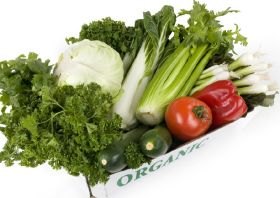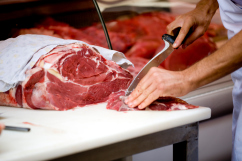Horticulture news
While Israel’s military bombardment of Gaza continues, Hamas’s rocket fire is pushing up prices of fruit and vegetables in Israel, as workers flee.
Israel’s recent and ongoing military assault on the Gaza Strip has once again brought death and destruction to what many commentators were already coining the world’s largest open-air prison.

According to Israeli officials, the campaign has been implemented to halt the rocket fire into Israel by Hamas, the organisation that governs Gaza and is labelled a terrorist group by many countries, including Israel, the US, the EU and Japan, although many nations, such as China, Russia, Iran and much of the Arab world, do not.
A report in Globes stated that the rocket fire had led to a jump in prices of certain fruit and vegetables in Israel due to irregular harvesting, as some farmers refuse to work in such conditions.
Wholesale tomato prices have risen by 47 per cent to ILS 6.5-6.8 (€1.40) per kilogram, melons by more than 180% to ILS 5.6-6 (€1.20-€1.30) per kilo.
Cauliflower prices have increased by 130% to ILS 7.6-8 (€1.64-€1.73) per kilogram, while cabbages are up by 46%.
Aharon Bitton, a farmer from Kibbutz Erez, commented: “The workers don’t want to work. The Thai, Bedouin, and Sudanese workers are all fleeing out of fear.”
Farmers from the Ein Yahav-based Yofi Shel Yerakot (Beauty of Vegetables) Cooperative told the Jerusalem Post that vegetables that had not been harvested in time and were therefore over-ripe may have to be sold to the Palestinian vegetable market in the West Bank.
Critics of the latest Israeli attacks argue that these actions stand no hope of bringing peace since they do not address the continuing illegal occupation of Palestinian territory by Israel, nor its illegal blockade on Gaza.
Retailer is working with lettuce supplier G’s to get more Icebergs on offer when good weather produces a crop flush
Tesco is to offer Icebergs to customers at two for 75p in a bid to boost sales and consumption of the leaf vegetable.

The retailer is working in partnership with G’s Fresh in what it calls “an effort to be more responsive to the natural peaks of the summer growing season”.
The two businesses are identifying where good weather is going to create a bumper crop, and setting up the special promotions in tandem with this to make extra lettuces available to customers at a lower price.
The first promotion went live in Tesco stores in early July, and also allows customers to mix and match their Icebergs with celery and beetroot from G’s Fresh.
Rick Clay, commercial manager for G’s Fresh, said: “This year Tesco gave us a base volume commitment for the whole of the season – something we’ve never had with any retailer before now – and we’ve worked together to come up with a plan to trade crop flushes as and when they occur. It’s all about being more responsive within the security of an underlying commitment.”
Adam Hill, Tesco’s salad sourcing manager, said: “This work is part of Tesco’s commitment to working in partnership with our suppliers and helping customers to tackle food waste from farm to fork.
“We want to make sure our customers benefit from the natural peaks in the growing season and over the coming months, customers and suppliers will see the benefits of this same approach across various British crops.”
The promotion will run until 26 July.
Switching from regular to organic produce could give same benefits as adding one or two portions to your current 5 A DAY intake

Organic food contains more of the antioxidant compounds linked to better health and lower levels of toxic metals and pesticides, according to a new study. The international team behind the study suggest that switching from regular to organic fruit and vegetables could give the same benefits as adding one or two portions of the 5 A DAY currently recommended, The Guardian reports.
The news outlet reported that the team, led by Professor Carlo Leifert at the University of Newcastle, found that there are “statistically significant, meaningful” differences between organic and regular produce, with a range of antioxidants being “substantially higher” – between 19% and 69% – in organic food.
It is believed to be the first study to demonstrate clear and wide-ranging differences between organic and conventional fruits, vegetables and cereals.
The researchers say the increased levels of antioxidants are equivalent to “one to two of the five portions of fruits and vegetables recommended to be consumed daily, and would therefore be significant and meaningful in terms of human nutrition, if information linking these [compounds] to the health benefits associated with increased fruit, vegetable and whole grain consumption is confirmed.”
However, Tom Sanders, a professor of nutrition at King’s College London, told The Guardian that while the research did show some differences, “the question is are they within natural variation? And are they nutritionally relevant? I am not convinced.”
He added that Leifert’s work had caused controversy in the past.
The results are based on an analysis of a record-breaking 343 previously peer-reviewed studies from all over the world which examine differences between organic and conventional fruit, vegetables and cereals.
The research is due to be published in the British Journal of Nutrition next week. It has, however, appeared on numerous medical sites this week.
Research suggests that online shopping is the way forward for butchers, with turnover from online retail expected to rise 175% in five years.

A study into the independent retail sector, commissioned by Eblex, showed that currently relatively few butchers sell online – total butcher’s shop sales are estimated to be worth £2.24 billion annually, but just 0.2% of this is accounted for by online sales. Only 8% of butchers currently offer online shopping, with those shops averaging three orders and an average sales value of £61 a week. However, Eblex said that large growth is expected in this area.
Matthew Southam, Eblex multiple retailer account manager, explained: “This survey provides revealing insight into the butcher’s shop sector and, in particular, the online marketing opportunity. When compared to other food businesses the proportion of turnover accounted for by online sales is quite low for butchers. While that’s to be expected in a sector which prides itself on personal service and where customers want to see and learn about the product they are buying, there is untapped potential for progressive butchers.
“The potential is huge: online retailing is an area that continues to grow as consumers change the way they purchase goods and butchers who offer an online shopping facility stand to benefit. We expect annual online sales to increase by 175% to more than £11m in five years as consumer demand increases and greater numbers of butchers embrace the e-commerce space and offer their customers an alternative, more convenient means of buying their meat.”
The research also suggested a lack of online presence generally within the sector: 67% of surveyed butchers didn’t have a company website. Furthermore, around half said they had no intention of developing a website, giving reasons such as “it would be too difficult”, “no time to deal with a website” and “don’t have a need for one”.
Southam added: “There is perhaps a perception that setting up and maintaining a website needs to be a time-consuming and expensive undertaking. That doesn’t always have to be the case. At Eblex, we are increasingly developing online tools and resources which are designed to help butchers to build their business and make the most of marketing opportunities.
“We recently launched an online image library (www.eblextrade.co.uk), providing retailers with access to a wide variety of beef- and lamb-related images, which they can use when developing and updating their websites. Given the anticipated increase in online sales over the next few years, we are now exploring the possibility of offering website templates to butchers who are members of the Eblex Quality Standard Mark Scheme.”
Poultry processor Moy Park has revealed plans for an expansion of three of its sites, which will create 628 new jobs.

The company, part of the Marfrig Global Foods group, has announced it will expand its three sites in Northern Ireland – at Dungannon, Ballymena and Craigavon – through a £170 million investment. The investment will include new processing lines and a new innovation centre.
Enterprise, trade and investment minister Arlene Foster said: “This investment, which will mean a £10.5m increase in wages and salaries annually for the local economy, is a huge boost of confidence in Northern Ireland as a European food production and manufacturing centre of excellence by a world-leading company.
“The expansion will further enhance Moy Park’s contribution to the local economy by enabling the business to achieve substantial growth in sales, mostly to customers outside Northern Ireland, by 2018.”
The 628 new jobs, 100 of which have already been posted will include roles in management, supervisory, processing and financial shared services. Foster said the announcement “is a sign of Marfrig’s on-going commitment to Northern Ireland. The new jobs are being created over a four-year period across Moy Park’s three sites, with a variety of roles available, including 70 high-value posts based in the new Innovation Centre.”
Marfrig Global Foods CEO Sergio Rial commented: “We are committed to growing our operations in Northern Ireland and this investment, with support from Invest Northern Ireland, helps us to achieve that. We have had ongoing, positive engagement with the Northern Ireland Executive and have experienced a very pro-business attitude.”
The CLA has said that sharing a farm with a younger person could counter the aging profile of farming industry
Sharing a farm with a younger person could enable thousands more to start a career in agriculture, the CLA has said.

The organisation said that if a quarter of the country’s farmers aged over 65 entered a share farming agreement it would allow more than 3,000 new entrants to start working the land.
Launching its major new drive to encourage share farming at today’s Great Yorkshire Show in Harrogate, CLA president Henry Robison said: “This is a simple solution to one of the industry’s most pressing problems – that of an ageing profile.
“Share farming not only offers older farmers a way of reducing their workload while maintaining an income but also gives new entrants an increasingly rare opportunity to start a career in agriculture.”
Share farming differs from traditional contract farming as both parties share the risk and the profits on a pre-agreed percentage. The existing farmer simply provides a portion of his farmland for the partner to work.
Robinson added: “The problem with traditional farming arrangement is that a farmer is either in or out. Share farming provides a middle ground whereby an ageing farmer, who cannot afford to retire, can start to wind-down without having to worry about paying the bills.
“A share farming agreement really is very straightforward and we have produced an easy-to-use advisory handbook that guides farmers through all the basics they need to get up and running including a template agreement.”
CLA rural surveyor Jacqui Stoddart said share farming offers a real hope for the thousands of talented young people desperate to get into the industry.
“It’s a very exciting project for us and we have already started working with the Federation of Young Farmers to look at ways of pairing up older farmers with younger people in their area, who are ready and willing to work,” she said.
Environment secretary Owen Paterson said: “I share the CLA’s commitment to doing all we can to help aspiring people take up jobs in the industry. Share farming gives new entrants more opportunities to start a business and build up their skills drawing from farmers with many years’ experience.”
Premium retailer’s food like-for-like sales were up 1.7% while online sales plummeted by 8.1%
Sales from Marks & Spencer’s website M&S.com fell by 8.1% in the first quarter of 2014, while food like-for-like sales rose 1.7%.

The company said its buoyant food business has been driven by a strategy to be more specialist, as well as new products.
Chief executive Marc Bolland said the new M&S.com site has had an impact on general merchandise sales, while food continues to outperform the market.
“Our food business had a great quarter with our strategy to be more specialist setting us apart from the competition,” he said. “With value top of mind for customers, we remained price competitive while protecting our gross margin. We launched some 700 new products giving customers more choice than ever.
“In line with our increased focus on margin, we were less promotional, both online and in stores. While this has affected the sales performance, particularly online, we are on track to deliver our full year gross margin guidance.”
Bolland confirmed that the premium retailer is on track to open 150 new Simply Food stores opening over the next three years.
He said the website has been “technically resilient” and confirmed the company is now focused on optimising the website commercially, with updates made on a regular basis.
“We have recently seen a gradual improvement in sales performance, despite a lower level of promotional activity. We expect to return to growth ahead of our peak trading period,” he added.
Trading conditions in the Republic of Ireland continue to be challenging, Bolland said, while sales in the Middle East were impacted by the timing of shipments to franchise partners.
Retailer confirms job losses after 45-day consultation period and interviews with staff as part of restructure strategy

Asda has today announced it will cut up to 1,360 jobs following an “intense consultation period” as it sets out to cater for new shopping habits.
The UK’s second largest retailer said the final outcome of the management restructure plan will create 5,670 roles, as it moves to emphasise e-commerce, puts more staff on shop floors and removes back office administration tasks.
But those who chose to leave after their roles were removed, or who did not meet the selection criteria, will take a redundancy package over the coming weeks.
“As much as it is my job, and privilege, to be CEO of this business and to do what is right for Asda as a whole, this is one of the most difficult decisions I’ve had to make,” said Andy Clarke, Asda chief executive. “While I genuinely believe that it is the right decision for the future of Asda, knowing that it will result in valued colleagues leaving us is not easy.”
Clarke said every supermarket must adapt to the intense changes in UK retailing or they will get left behind.
He first publicly outlined a proposal to restructure store management in May of this year, and the 4,100 staff directly affected entered a formal 45-day consultation period.
During the consultation, managers affected by the proposal were involved in influencing the final version that was considered by its executive team yesterday.
Asda said that all staff members affected had at least three individual discussions about the proposal and the roles potentially available to them. Each executive team member also visited stores to meet affected colleagues and listen to their views.
Twenty-seven fatal injuries to agri-workers in the industry in 2013/14, lower than the average of 33 for the past five years
The number of agricultural employees that have died at work in Great Britain over the last year has been recorded at its lowest rate for half a decade.

There were 27 fatal injuries to workers in the industry between April 2013 and March 2014, lower than the average of 33 for the previous five years.
Provisional data released by the Health and Safety Executive (HSE) this week also revealed compared with 150 in the previous year, 133 workers were fatally injured in the most recent period the data covers – the lowest annual rate on record.
The overall rate of fatal injury has dropped to 0.44 per 100,000 workers, compared to 0.51 in 2012/13.
Judith Hackitt, HSE chair, said: “The release of the annual statistics always leads to mixed emotions. Sadness for the loss of 133 lives, and sympathy for their families, friends and workmates, but also a sense of encouragement that we continue to make progress in reducing the toll of suffering.
“Whilst these are only provisional figures, they confirm Britain’s performance in health and safety as world class. For the last eight years we have consistently recorded one of the lowest rates of fatal injuries to workers among the leading industrial nations in Europe.”
The government’s health and safety minister Mike Penning, said: “Any death at work is a death too many. But these statistics show that workplaces are getting safer.
“The Health and Safety Executive do an excellent job in making sure each and every one of us can go out to do an honest day’s work in the knowledge that our safety is being taken seriously.”
There were four fatal injuries to workers in waste and recycling between April 2013 and March 2014, lower than the average count of seven over the last five years.
In all, 106 fatal injuries in England were recorded – a rate of 0.41 deaths per 100,000 workers, compared to an average of 134 deaths in the past five years and a decrease from the 119 deaths (and rate of 0.47) recorded in 2012/13.
There were 20 fatal injuries in Scotland were recorded, a rate of 0.78 deaths per 100,000 workers, compared to an average of 21 deaths in the past five years and a decrease from the 23 deaths (and rate of 0.90) recorded in 2012/13, and seven in Wales – a rate of 0.52 deaths per 100,000 workers, compared to an average of 10 deaths in the past five years and a decrease from the 8 deaths (and rate of 0.61) recorded in 2012/13.